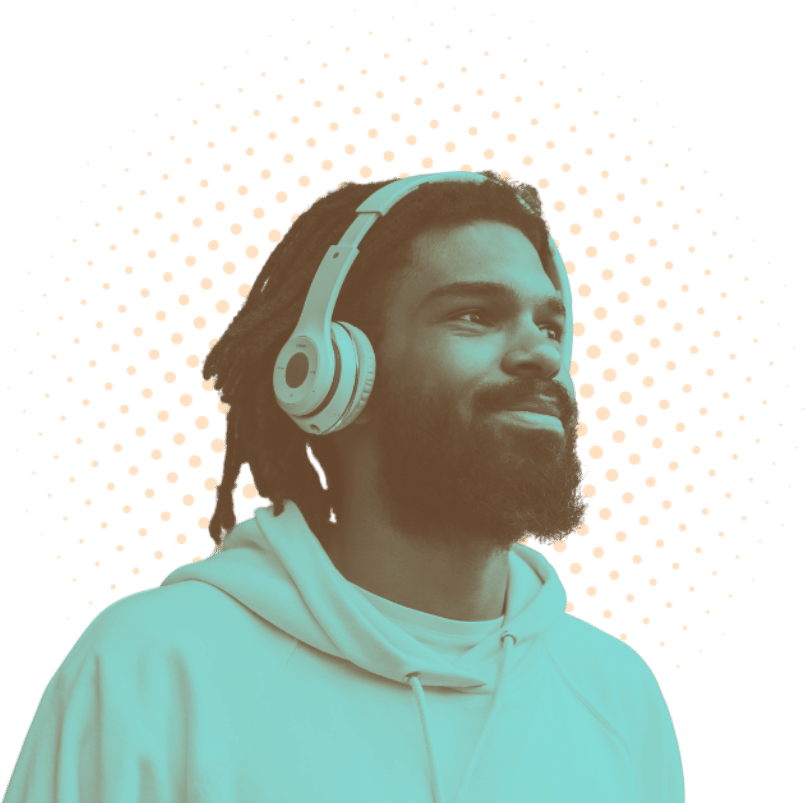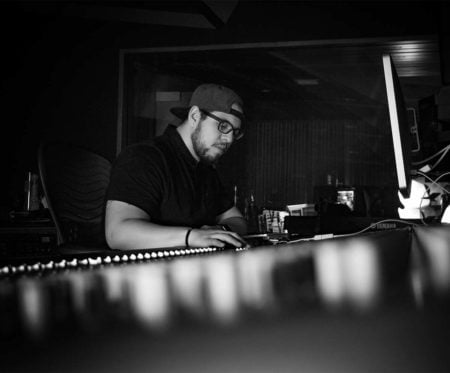
The Hideout
Las Vegas, NV
Hear from Luis Pacheco's Students
Notable Clients of Luis Pacheco
-
50 Cent
-
Alicia Keys
-
Lady Gaga
-
DJ Cassidy
-
Dr. Dre
-
Miguel
-
Robyn
-
ESPN
-
HBO
-
Pixar
-
Sony
AMPLIFY YOUR LIFE
WITH AUDIO
ENGINEERING AND
MUSIC PRODUCTION
IN-PERSON MENTORSHIP
Are you our next Success Story?

"*" indicates required fields
Notable Apprentices:
Meet Your Music Pro, Luis Pacheco
Q. Luis Pacheco on the Sanctity of the Creative Bubble
 Lil Wayne, Wiz Khalifa, 50 Cent, Alicia Keys, G-Unit, Lady Gaga, and loads of other artists have recorded at The Hideout in Las Vegas, where Recording Connection mentor engineer/producer Luis Pacheco can be found working with some of today’s biggest artists and teaching the pros of tomorrow.
Lil Wayne, Wiz Khalifa, 50 Cent, Alicia Keys, G-Unit, Lady Gaga, and loads of other artists have recorded at The Hideout in Las Vegas, where Recording Connection mentor engineer/producer Luis Pacheco can be found working with some of today’s biggest artists and teaching the pros of tomorrow.
For Luis, music is nothing short of one of the highest forms of art. And since making art is the goal, everything must work in service of the art and artist, whether the “artist” he’s collaborating with is a composer, producer, or world-renowned performer. Understandably then, Luis is selective about who he lets into the room during a collaborative session or as he likes to call it, “the creative bubble”:
I’ve collaborated with quite a few artists and I feel like there’s a studio etiquette to that too. It’s not about being a person who says, ‘Okay, I want to do things my way and we’re not going to listen,’ you know? It’s more about having an open mind. I feel like you have to visualize it as a creative bubble. You’re letting the collaborator be in the creative bubble with you to co-create something.”
There’s a definite upside to getting into the bubble with other producers and engineers:
You can learn different workflows and how people work. Cause all that stuff is different from person to person. You pick up on things yourself, too, so that you can better your workflow. Because I mean, I feel like everyone is always going to be constantly learning. That’s just part of this career path, because there’s always going to be new gear, new this, new that.”
But be cautious and remember the creative bubble needs to be safeguarded, especially when recording vocals or a player:
You have to be careful because the slightest thing can turn a session rollercoaster ride. Remember every session is different. So it’s like you kind of have to acclimate to it, and not just by the stuff that you know, but more of just like being a psychiatrist sometimes…kind of letting the them know that this is a comfortable place to record…You want to word things positively…There are so many ways of doing it, but you just want…to be like, ‘Hey, that was a great take, but maybe we could get one better,’ or something like that.”
When asked about whether there’s a place for ego in the studio, Luis is emphatic about in his stance:
“No. You’ve got to leave that all at the door. You have one goal as a producer to make something sound good, create something good. So it’s like if you have some sort of negative vibe, it’s not going to work. So you’ve got to have an open mind.”
Q. Tips on Hip-Hop Production from Recording Connection mentor engineer/producer Luis Pacheco

Recording Connection mentor engineer/producer Luis Pacheco
Recording Connection mentor Luis Pacheco is one of our top go-to mentors for students who are interested in studying EDM and hip hop production. Teaching students out of The Hideout in Las Vegas, NV—a world-class facility with a client list that includes names like 50 Cent, Alicia Keys, G-Unit, Ice T, Lady Gaga and a host of others—Luis is a music industry veteran with a lot of helpful advice to offer.
During a recent conversation with RRFC, Luis shared tips on hip-hop production and how to work with clients in the studio environment. He also offered some helpful tips on the ins and outs of hip hop production which should be useful to many of our students. Enjoy!
TIPS ON COLLABORATING WITH ARTISTS IN THE STUDIO:
“I’ve collaborated with a few artists. I feel like there’s almost a studio etiquette to that too, to not just being like the person that, ‘Okay, I want to do things my way and we’re not going to listen to you,’ you know? It’s more of having an open mind, and I feel like you have to visualize it as a creative bubble, and you’re letting the collaborator be in the creative bubble with you to co-produce something…You learn different workflows and how people work. It’s all different. And you pick up on things yourself, too, so that you can better your workflow, because I mean, I feel like everyone is always going to be constantly learning. That’s just part of this career path, because there’s always going to be new gear, new this, new that.
You’ve got to leave that [ego] at the door. You have one goal as a co-producer: To make something sound good, make something good, create something good. So it’s like if you have some sort of negative vibe, it’s not going to work. You’ve got to have an open mind.”
PRACTICAL TIPS ON HIP HOP PRODUCTION:
“As a hip hop producer, it’s more of knowing dynamically how to arrange things and just really having an ear for it. I mean, producing-wise, just having an ear for it and thinking outside the box, too…
The bass, the drums, they always need to be up. And everything else I feel like can kind of fall back a little bit. It’s just very situational, but most of the time it’s just drums and bass is what the listener wants to hear most, and vocals once the vocals are in…
In mixing a hip hop track, the bass can get crazy. So it’s being sure to control that bass, because in a hip hop track it’s like I want to hear the bass, but I want to hear it in certain frequencies. So what I’ll usually do is round off a little bit of the low end…I want that punch, but I don’t want the sub-y sub, because there can be pretty uncontrollable sub frequencies that you really don’t need…That’s why I take it out, because that mud is just—and a lot of people just bring up the bass and they’re like, ‘Okay,’ and they’ll call it a track. I usually get a lot of tracks that come in that the bass is just pushed up all the way and there’s not much I can do as far as working with the track…It’s just something that I wish all producers knew, you know, the bass can just get a little bit out of hand sometimes.
For hip hop, what I’ll usually have them do is run like five takes or whatever it needs, and based on the first couple of takes I can direct the other takes, like tell them, ‘You need more energy,’ or maybe if the song is a little cooler, ‘You kind of want to relax a little bit.’ But it’s just having that line of communication with the client and telling them, directing them in a way that they come out with a great product. That’s definitely something that’s key, because if you have a bad recording you only have so much to work with, but if you have a great recording, you can only get better from there…Good in, good out.”
ADVICE ON THE GEAR YOU NEED:
“Students always ask me, ‘What should I get? What kind of interface should I get?’ I kind of try to direct them in the proper direction, like a good DJ converter with some flat speakers, just something that is perfect for mixing. Not everyone is going to mix, or is just going to mix. I have some students that want to produce as well. So maybe they’d want to use something else, like some KRK’s that have a little bit more of the low-end boost. Every student is different, everyone has a different learning style and I try to acclimate to that…Everyone has a different budget, everyone has different needs. So it’s all very situational.”
ON WHY HE ENJOYS MENTORING STUDENTS:
“I really like teaching…I always try to look at the younger version of me and help them out. That’s what I want to do [with] these externs, the students that come in. I just want to help them out as much as possible and give them the information that I had to learn on my own sometimes…I tell them right off the bat that this is going to be like a job: Coming in on time, being professional during sessions, having the studio etiquette and keeping everything professional, and then the approach, the actual learning is, I try to give them hands-on…I’d rather guide them instead of them being at home kind of stuck on something and feeling discouraged or anything like that. It’s better for me to give them as much time for them to make mistakes, and I can just guide them…I’ve made my fair share of mistakes just so that you learn. Kinesthetic learners learn by doing. So if you make a mistake, you know that that’s a mistake. It’s that much more helpful to that sort of learner.”
FINAL WORDS OF ADVICE:
“Keep your head up. Opportunities are everywhere. It’s just about opening the door and running with it.”
Notes:
Luis has over 13 years experience as a music industry pro. He’s worked with 50 Cent, Alicia Keys, G-Unit, Ice T, Lady Gaga and a host of others. Get connected with Luis and up the level of your audio skills.